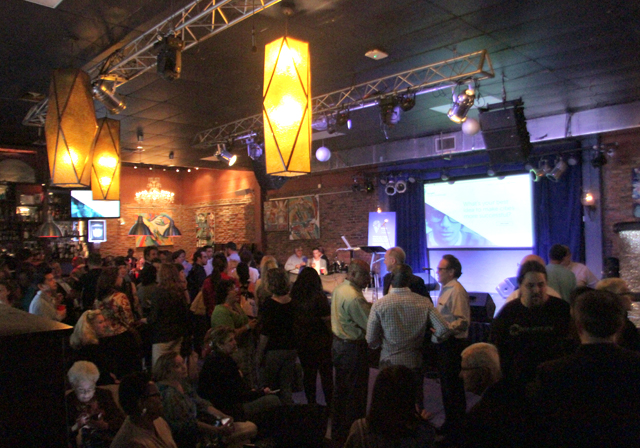
Miami takes on Knight Cities Challenge
About 300 people attended the Knight Cities Challenge information session at The Stage in Miami’s Design District Tuesday evening. Photo by Jenna Buehler
GET KNIGHT CITIES CHALLENGE EMAIL UPDATES
City visionaries crowded The Stage in Miami’s Design District Tuesday night to learn more about the Knight Cities Challenge and potentially share in $5 million available to innovators willing to do the work to make cities more successful.
The challenge, a national call for ideas that can be put to work in one or all of 26 communities where Knight Foundation invests, opened Oct. 1 and closes at 5 p.m. Eastern Time Nov. 14.
That big ideas can take place anywhere was a common theme at the event. Examples of repurposing underused spaces as “people places” were presented by representatives from Gehl Architects, who were visiting Miami as part of an effort to learn more about Knight’s efforts. The foundation has been interested in Gehl’s work because of its track record in making cities more livable, which cultivates the attraction and retention of talent, creates economic opportunity and enables civic engagement, essential elements of city success.
Knight Foundation Miami Program Director Matt Haggman emphasized that the elements required for disruptive change already exist in Miami. This community, he said, is a prime destination for anyone from anywhere with concepts they want to put to work.
“The Knight Cities Challenge is another opportunity to allow you to pursue your ideas in Miami without seeking permission,” Haggman said. “No idea is too small, but we do want big ideas.”
Gehl Managing Director Jeff Risom and Associate John Bela shared personal anecdotes of how simple, inexpensive ideas can impact communities around the world. They said that people-centered design in architecture is one way to inspire community engagement.
Risom said the Gehl New York studio helped rethink city space once used solely for transportation–an opportunity to improve traffic conditions while adding bike paths, seating and other public spaces that encourage people to interact.
“We reclaimed more than 400,000 square feet of space — from Broadway to Grand Central Park to Union Square and over to Rockefeller Center — that wasn’t efficiently utilized,” Risom said. “The evolving civic roles between decision-maker and citizen are manifested in opportunities like this.”
Bela, the founder of “Park(ing) Day,” said that ideas that transform space do not need to be expensive to have big impact. He said that the movement began in San Francisco with a mere $500 for a park bench set up in the center of a parking space and led to a groundbreaking art installation that continues to spread globally.
“Civic leaders no longer have to ask permission,” Bela said. “We never asked permission; in fact, we still haven’t.”
Experimenting to see if an idea will work doesn’t take much effort, he added, citing the original implementation of what he calls the “prototype parklet”.
“Someone began to eat pizza on the bench,” he said, “and then citizens sat down to have a conversation on that bench and then knew we were on to something.”
Jenna Buehler is a Miami-based freelance writer.
What’s your best idea to make cities more successful? The Knight Cities Challenge offers applicants a chance to share in $5 million by focusing on that question. The contest will test the most innovative ideas in talent, opportunity and engagement in one or more of 26 Knight Foundation communities. The challenge is open for entries through 5 p.m. Eastern Time Nov. 14, 2014. Apply at KnightCities.org
Recent Content
-
Community Impactarticle ·
-
Community Impactarticle ·
-
Community Impactarticle ·


